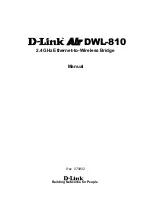
Appendix E: DDNS Application
1. Preface
If you have a Cable modem or xDSL, this is a great way to host your own Networked Device
or
other TCP/IP Service. Get your own domain like www.yourname.com, www.yourname.com.tw
etc. (Note: This domain must be registered with Internic via registration authorities such as
Network Solutions, DirectNIC, and Register.com etc). Your domain name's dynamic IP
address is automatically tracked by a DDNS server.
Host your own Networked Device
and much more no matter what your computer's IP address
may be and even if you have dialup, DSL or cable modem internet connection where your
computer's IP address changes all the time!! DDNS service supports all top level domain
names including but not limited to .com, .net, .org, .to, .uk etc.
2. Ethernet Network Environment
Normally, DDNS service is only necessary for the users that could only obtain dynamic IP
addresses. As to the users that could obtain the static valid IP address, they do not usually
have to apply the DDNS service. Before we decide if DDNS is necessary for the users, we
have to check what kind of Ethernet network environment we have to install our Networked
Device on.
(1) Environment of Fixed Valid IP Network
If users could obtain valid IP addresses, they could save the effort to apply DDNS service.
Because the IP address in this environment is fixed, users could input the IP address or
domain name of demo site directly in the IE browser.
(2) Environment of Dynamic IP Network
If users is under an environment of dynamic IP network (Dial-up xDSL), they have to apply a
domain name in advance. Then apply DDNS service. Finally setup the necessary information
of DDNS and PPPoE of the Networked Device in order to let the outside administrator be able
to access through internet.
3. Application Steps – DDNS & Domain Name
(1). Visit the following web site:
(2). Click “
Account
”
77















































